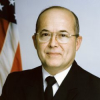John Poindexter

John Poindexter
John Marlan Poindexteris a retired United States naval officer and Department of Defense official. He was Deputy National Security Advisor and National Security Advisor for the Reagan administration. He was convicted in April 1990 of multiple felonies as a result of his actions in the Iran–Contra affair, but his convictions were reversed on appeal in 1991. More recently, he served a brief stint as the director of the DARPA Information Awareness Office for the George W. Bush administration. He is...
NationalityAmerican
ProfessionPublic Servant
Date of Birth12 August 1936
CountryUnited States of America
I didn't particularly want to come back into government and run it. However, in the end, it seemed like the only way we could get it off the ground.
The privacy work was part of what was canceled. But I think it should continue. And I think that eventually it will be continued. I'm an optimist.
The 9/11 Commission is identifying the exact problems that we were trying to get technology to solve. So I keep pushing the idea.
Now, I don't think I would say that officially. But certainly I felt a great frustration that we had not been able to avoid 9/11.
The problem we were struggling with within the closed market was what the incentive would be. You probably wouldn't use dollars. But those are all questions that need to be explored.
You accept failure as a possible outcome of some of the experiments. If you don't get failures, you're not pushing hard enough on the objectives.
TIA was being used by real users, working on real data - foreign data. Data where privacy is not an issue.
I think if I had to do it over again, I'd do it the same way. I would just put more resources into getting the public diplomacy part much stronger than we were able to.
Uncontrolled access to data, with no audit trail of activity and no oversight would be going too far. This applies to both commercial and government use of data about people.
I knew from the beginning that privacy was going to be a huge issue, especially with regard to applying Total Information Awareness in counterterrorism. Because if the technology development was successful, a logical place to apply it was inside the United States.
We wanted to be as expansive as possible to make sure we didn't preclude some good ideas.
I think it is very difficult today to have a reasoned public discourse on any controversial subject. Certainly, election years present a complicating factor.
It would be ideal if we could have an uncontrolled flow of information. But we realized you can't do that.
Nobody - myself included - believes that we could ever achieve total information awareness. But the government needs to set goals and long-range objectives. Total information awareness is a good goal.